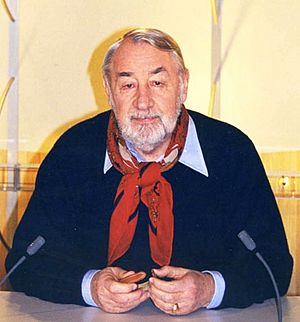Philippe Noiret facts for kids
Quick facts for kids
Philippe Noiret
|
|
|---|---|

Noiret in 2000
|
|
| Born | 1 October 1930 |
| Died | 23 November 2006 (aged 76) |
| Occupation | Actor |
| Years active | 1948–2006 |
| Spouse(s) | Monique Chaumette (1958) |
| Awards | BAFTA Best Actor in a Leading Role 1990 Nuovo cinema Paradiso César Best Actor 1976 Le Vieux fusil 1990 La Vie et rien d'autre |
Philippe Noiret (born October 1, 1930 – died November 23, 2006) was a famous French film actor. He was known for his calm voice and often played wise or thoughtful characters. He appeared in over 100 movies during his long career.
Contents
Life and Career
Early Life and Stage Work
Philippe Noiret was born in Lille, France. His mother was Lucy Heirman, and his father, Pierre Noiret, worked for a clothing company. Philippe was not a very good student. He went to several well-known schools in Paris.
He tried many times to pass his high school exams, called the baccalauréat, but he failed. Because of this, he decided to study acting instead. He trained at a drama center and then worked with a theater group called the Théâtre National Populaire for seven years.
During this time, he met Monique Chaumette, who was also an actress. They got married in 1962. Philippe also performed as a comedian in nightclubs with his friend Jean-Pierre Darras. They would make fun of famous politicians of the time.
Becoming a Film Star
Philippe Noiret first appeared in a movie in 1949, but his role was not officially listed. In 1955, he was in a film called La Pointe Courte. The director, Agnès Varda, said he had a rare talent. Philippe played a young man in love in a fishing village. He later said he was very nervous during filming.
He did not get another movie role until 1960, in Zazie dans le Métro. After playing smaller roles in a few more films, he became a regular face in French movies. He became a big star in France with the film Alexandre le Bienheureux in 1968.
Philippe once said that he was surprised by his success in movies. He and other actors of his time mostly wanted to be stage actors. He started doing movies for the money. But after a few years, he began to really enjoy it. He found acting for movies very interesting.
Famous Roles and Later Career
Philippe Noiret starred in many important films. In 1976, he won his first major award, a César Award, for his role in Vieux Fusil. He won a second César Award in 1990 for his part in Life and Nothing But.
He also worked in Hollywood films with famous directors like Alfred Hitchcock and George Cukor. However, he is probably best known for playing Alfredo in Cinema Paradiso (1988). In this movie, he played an old projectionist who teaches a young boy about movies and life.
He also played the poet Pablo Neruda in Il Postino and Major Dellaplane in Life and Nothing But. By the time he passed away from cancer in Paris in 2006, he had acted in over 100 films. He was 76 years old.
Philippe often joked about how much he worked. He said it was good to always be making another film. This way, if one movie was not popular, he was already busy with a new project. He felt it helped him to keep going.
Awards
Philippe Noiret received many awards for his acting:
- BAFTA Award for Best Actor in a Leading Role
- 1990 – Nuovo Cinema Paradiso
- César Award for Best Actor
- 1976 – Le Vieux Fusil
- 1990 – La Vie et rien d'autre
Selected Films
| Year | Title | Role | Director | Notes |
|---|---|---|---|---|
| 1955 | La Pointe courte | Lui | Agnès Varda | |
| 1960 | Zazie dans le Métro | Uncle Gabriel | Louis Malle | |
| 1962 | Le Crime ne paie pas | Clovis Hugues | Gérard Oury | (segment "L'affaire Hugues") |
| Thérèse Desqueyroux | Bernard Desqueyroux | Georges Franju | ||
| 1964 | Cyrano and d'Artagnan | King Louis XIII | Abel Gance | |
| 1966 | Who Are You, Polly Maggoo? | Jean-Jacques Georges | William Klein | |
| 1968 | Alexandre le bienheureux | Alexandre | Yves Robert | |
| 1969 | Justine | Pombal | George Cukor | |
| Topaz | Henri Jarré | Alfred Hitchcock | ||
| 1973 | La Grande Bouffe | Philippe | Marco Ferreri | |
| 1974 | L'Horloger de Saint-Paul | Michel Descombes | Bertrand Tavernier | |
| 1976 | Le Juge et l'Assassin | Judge Rousseau | Bertrand Tavernier | |
| 1980 | A Week's Vacation | Michel Descombes | Bertrand Tavernier | |
| 1981 | Tre fratelli | Raffaele Giuranna | Francesco Rosi | |
| Coup de Torchon | Lucien Cordier | Bertrand Tavernier | ||
| 1984 | Les Ripoux | René Boisrond | Claude Zidi | |
| 1988 | Nuovo Cinema Paradiso | Alfredo | Giuseppe Tornatore | |
| 1989 | La Vie et Rien D'autre | Commander Dellaplane | Bertrand Tavernier | |
| 1993 | Tango | François d'Amour | Patrice Leconte | |
| 1994 | The Postman | Pablo Neruda | Michael Radford - Massimo Troisi | |
| 2007 | Trois amis | Serano | Michel Boujenah | (final film role) |
See also
 In Spanish: Philippe Noiret para niños
In Spanish: Philippe Noiret para niños
 | Ernest Everett Just |
 | Mary Jackson |
 | Emmett Chappelle |
 | Marie Maynard Daly |

